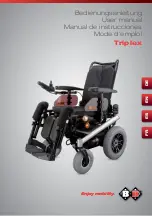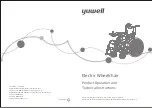
Fi
t a
n
d u
se
16
17
Retractable tie-downs
Retractable tie-downs
Figure 12
A - slide on
B - rotate 90°
D
Figure 10
A
B
C
Figure 4
Figure 8
Rear
securement
points
Wheelchair
reference
plane
45°
30°
SIDE VIEW
REAR VIEW
10°
10°
300mm
(12in)
NOTE Note that angles indicated are obtained by projecting the angle of each tie-down strap
onto a vertical plane parallel to the wheelchair reference plane (side view) or onto a vertical
plane that is perpendicular to the wheelchair reference plane (rear view).
Figure 3
Figure 11
C
B
A
1.
The Solo floor anchors will have been installed in the vehicle in accordance
with their own and the vehicle converter’s instruction. Position the wheelchair
within the vehicle as required.
2.
Install each front retractor cleat onto a front Solo anchor by aligning the open
mouth of the cleat and the protrusion, (Fig. 11C), to the slot on the floor anchor.
Slide the cleat fully home (allowing the keyway within the cleat to guide into
its home position, Fig. 11A & B) and rotate the cleat through 90° to align the
retractor with the wheelchair frame, (Fig. 12).
3.
Dependent on retractor type, follow instruction:
Quattro: Press the release button(s), (Fig. 10B), to release the webbing and
attach each J-hook arrangements to the wheelchair’s rear frame, with the
open gate facing outboard. (Some wheelchairs will indicate this position, Fig.
3). Press the yellow button(s) again to remove the webbing slack.
Quattro Express:
Webbing can be extended from the reel without pressing
the yellow button if the lock label, (Fig. 10D), is NOT visible. Attach each of the
wheelchair attachments to the wheelchair’s rear frame. (Some wheelchairs
will indicate this position, Fig. 3). The yellow button must be pressed if
extending webbing with the label in view, (Fig. 10B). The webbing will retract
automatically into the reel.
IMPORTANT: The yellow locking label must be
fully visible to ensure that the reel is locked off, (Fig. 10D).
4.
Final tensioning is achieved by turning each tensioning handle, (Fig. 10B), until
the webbing is equally taut on each side.
5.
Ensure that the webbing of each tie-down is approximately the same length,
and at an angle of around 30 to 45°, within the rear view zone, (Fig. 8).
6.
The occupant restraint must now be fitted. Please refer to relevant manual.
Removing the combined retractable
tie-downs
IMPORTANT: First remove the
occupant restraint.
1.
Release the tension in the front
tie-downs by pressing the yellow
button, (Fig. 10B), and extending
the webbing to allow the J-hook,
(Fig. 10A), to be removed from the
wheelchair frame. If the webbing
is particularly tight, it may be
necessary to slightly ’tension’ the
webbing with the hand wheel,
(Fig 10C), while pressing the yellow
button, (Fig. 10B), to remove the
webbing lock on the retractor.
2.
Remove each front retractor from
the anchor by rotating the tie-
down through 90° so that the
raised protrusion, (Fig. 11C), on the
cleat is facing its parallel cleat.
3.
Pull the tie-down away from the
floor anchor and store safely.
Fit and use
C
lassic
retractable tie-downs
Solo anchor - fixed stalk (K- products) - rear






































